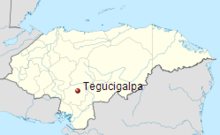Prevalence and causes
Geographical predominance

The areas most heavily affected by HIV/AIDS cases tend to be within what is called the Central Corridor of Development (Corridor Central de Desarrollo), affecting urban areas such as Tegucigalpa, San Pedro Sula, La Ceiba, El Progreso, Comayagua, Puerto Cortés, Tela, La Lima, and Choluteca. The disease originated in the northern part of the country, with especially high rates in Tegucigalpa and San Pedro Sula, which was the original epicenter of the disease. [3]
In San Pedro Sula, rates of HIV prevalence were estimated to be as high as 14 to 21% of the population at the height of the epidemic in Honduras. HIV/AIDS has since spread to the south, east, and west of Honduras, including the Honduran Bay Islands in the Caribbean, though these regions were affected later. [3] Municipalities with the highest reported incidences of HIV infection are found on the border with neighboring countries El Salvador, Guatemala, and Nicaragua. [1] On the northern coast of Honduras, the Garífuna minority group experiences particularly high rates of HIV prevalence. [2]
Demographical predominance
HIV/AIDS has most affected young people in Honduras, ranging from 20 to 39 years of age. [3] The main risk groups associated with HIV/AIDS in Honduras are female sex workers (FSWs), men who have sex with men (MSM), the Garífuna community, prisoners, and transgender women. [1]
The United Nations Joint Programme on AIDS (UNAIDS) released the following statistics regarding the HIV prevalence among different risk groups in Honduras: [9]
- 5.3% among sex workers
- 11.7% among gay men and men who have sex with men
- 11.9% among transgender people
Prevalence rates among prisoners have been found to be as high as 7.6%. [10] In 2005 the national prevalence among sex workers was 9.68% according to a UNAIDS document on CONASIDA. 47% of the cases of HIV recorded in 2004 were women, [7] and in that same year around 0.5% of women in antenatal surveillance studies were HIV positive. [11] Overall, women account for more of emerging infections than men do. [8]
Proposed national causes
While it is not known exactly why the epidemic in Honduras became so severe, some experts, such as epidemiologists like Manuel Sierra, attribute its severity to the long incubation period of the disease in the country. Other reasons to which specialists attribute the state of the Honduran epidemic include increased international military presence due to the Cold War, during which Honduras experienced an influx of both international military personnel and also contras from neighboring Nicaragua, who helped to stimulate the commercial sex industry on a national level. [10]
Among the Garífuna
The Garífuna, of Afro-Caribbean descent, are one of at least eight minority groups within Honduras and one of the few for which HIV prevalence rates are known. [11] Heterosexual transmission rates among the Garífuna are comparable to those of sub-Saharan Africa. [12] As of 2005, the prevalence of HIV among the Garífuna was estimated to be somewhere between 8 and 14% of this population. [7]
Among this population, condom use was reported in 2009 to be only 10.6% in stable couples and 41.4% in casual couples. [13] HIV was higher among Garífunas residing in urban areas. In addition to low condom use and urban living, researchers suggest that the high rates of HIV prevalence may be due to the migratory working patterns of Garífuna men, who often travel seasonally to the United States or cities, such as San Pedro Sula where HIV prevalence is particularly high, for their jobs in shipping and fishing. Other possible contributing factors are sexual violence, the inability of women to control their sexual experiences, multiple sex partners, remuneration received for sex, with 6% of subjects reporting having received money for sex in a 2009 study, and first sexual encounters for men at 15 and women at 17. [11]
Prevalence among Garífuna was 3.8% among men and 5.1% among women as of 2006, indicating rates more than three times those of the national average. In a 2015 study, men were found to be more than four times as likely to have had multiple sex partners within the last 12 months than women. [8] Garífuna women remain an especially disenfranchised group and have been subject to treatment methods as radical as forced sterilization. [2] Only 9% of Garífuna men were reported to have been circumcised, [11] which is proven to be a successful method at lowering risk of HIV contraction through heterosexual transmission by as much as 60%. [14] High rates of other sexually transmitted infections (STIs) such as syphilis and herpes (HSV-2) were also found among the Garífuna in a 2009 study, [11] and high rates of other STIs are linked to a higher risk of HIV infection. [15]
Although traditional health care is available to some within this community, the Garífuna have also developed their own methods of educating their community and spreading knowledge of prevention: utilizing their traditional musical forms to accompany informational plays about HIV/AIDS. [16] Organizations, such as the Pan American Social Marketing Organization (PASMO), have adopted similar education tactics, such as bingo games in which each space on a playing card contains a picture of HIV/AIDS or another STD. [10]





